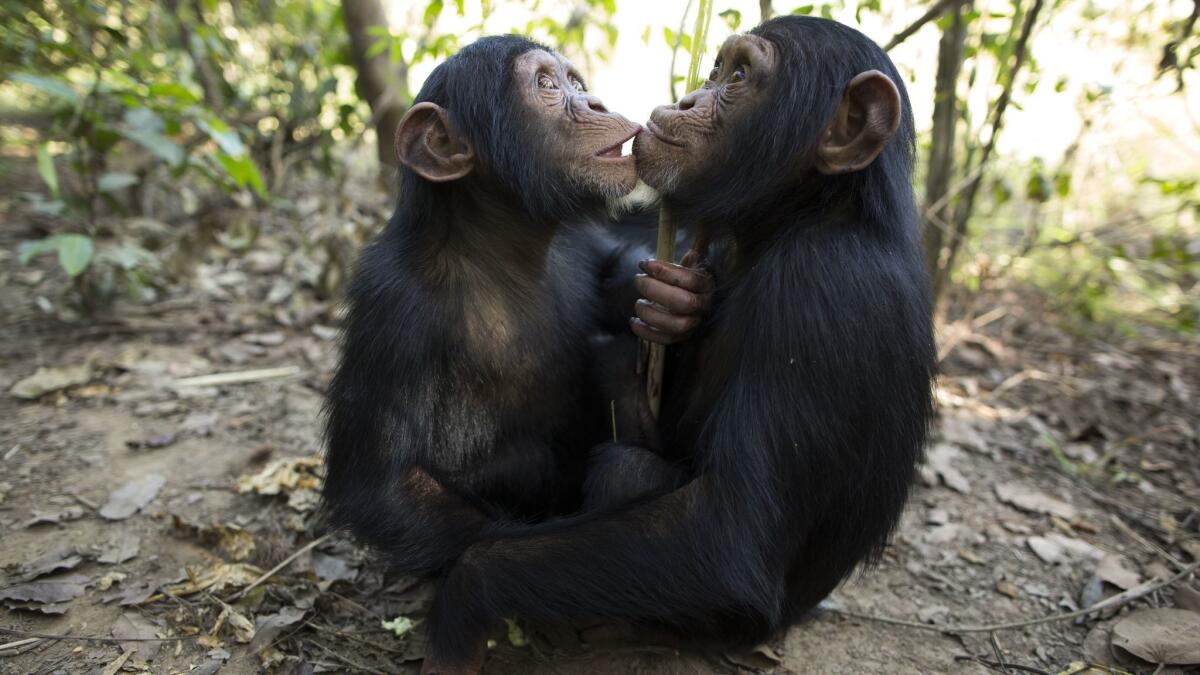Chimpanzees need friends too — their stress levels show it

- Share via
A little social support from your best buds goes a long way, whether you’re a human or a chimp. A new study that followed a chimpanzee community in the forests of Uganda has found that quality time with close companions significantly decreased stress hormone levels in the primates — whether they were resting, grooming or facing off against rival groups.
The findings, described this week in the journal Nature Communications, shed light on the physiological effects of close companionship in chimps — and could have implications for human health too.
Researchers have long known that stress can worsen health and raise the risk of early death in humans as well as other social mammals.
“It can have effects on immune function, cardio function, fertility, cognition, even your mood,” said study coauthor Kevin Langergraber, a primatologist at Arizona State University.
Maintaining close social bonds can help these animals (humans included) buffer some of that stress, potentially mitigating some health risks. But scientists have yet to pin down the exact physiological mechanisms at work.
“Social bonds make you survive and produce better — but how do they do that?” Langergraber said.
To find out, the international team of researchers studied members of the Sonso chimpanzee community in Uganda’s Budongo Forest, a group consisting of 15 males, 35 females and 28 juveniles and infants during the study period from February 2008 to July 2010.
Like humans, chimpanzees tend to have besties — bond partners with whom they appeared to feel close. (Just as some humans might have one or two close friends and others have more, the number of bond partners varied for each chimp.) The researchers wanted to see whether interactions with these bond partners led to lower stress levels during particularly stressful situations, such as when fighting rival groups, or whether time spent with friends helped lower stress levels more generally, throughout the day.
The scientists observed the chimps perform three types of activities: resting, grooming or squabbling with other groups of chimps. (Sometimes these were actual encounters with rival groups, and sometimes the researchers tricked the chimpanzees by banging on the large buttress roots of nearby trees, causing the chimps to react aggressively.) The researchers kept track of whether the chimps were doing any of these three things with their bond partners or with other chimps in their group.

Raw video shows chimpanzees patrolling and encountering rival groups.
A team of up to six observers watched the chimps and followed them around to collect urine samples. The samples, collected from nine adult male and eight adult female chimps, were tested to see how much of the stress hormone cortisol they contained.
This, by the way, was no task for the faint of heart. It involved following individual chimps for six hours after observing one of the three activities, and, while recording every change in behavior, getting up close and personal with the animals’ bodily fluids.
“Urine was either pipetted from plastic bags, after the bags were tied over a forked stick and held in the urine stream when subjects were sitting in a tree, or from leaf matter when urination occurred on the ground after subjects had moved away,” the study authors wrote. “After collection, urine samples were stored in a thermos flask containing ice and were frozen in liquid nitrogen upon arrival in camp, which was within 10 h after collection.”
And yes, in case you were wondering, the observers did sometimes get splashed.
“Sometimes you [end up] collecting a little bit of the sample in your face, and wherever else, and that’s not ideal,” Langergraber said.
The scientists found that chimpanzees’ levels of urinary cortisol (plus four of cortisol’s metabolites) were 23% lower, on average, during the activities when they were with their bond partner. This was especially true for stressful activities, such as the intergroup rivalries, where any chimp on the front line might face physical harm or even death.
The findings dovetail well with earlier research showing that levels of oxytocin — the so-called “cuddle hormone” — rise during grooming, Langergraber said.
“It might be indicating that oxytocin might have a dampening role in cortisol secretions ... so it’s giving you some more knowledge about the complicated ways in which these hormones interact,” he said.
The findings in chimpanzees, some of our closest living relatives, could shed light on the role such close social relationships play in human health too, he said. Such friendships may be just as important during good times as bad — though more research needs to be done before any conclusions can be drawn.
“This has interest for a lot of people in a medical context as well,” Langergraber said.
Follow @aminawrite on Twitter for more science news and “like” Los Angeles Times Science & Health on Facebook.
MORE IN SCIENCE
Accepting more Facebook friend requests is linked to lower mortality, study says
Mobile devices in the bedroom rob kids of sleep, study says
UPDATES:
5:45 p.m.: This story has been updated with additional detail throughout.
This story was originally published at 1:25 p.m.




